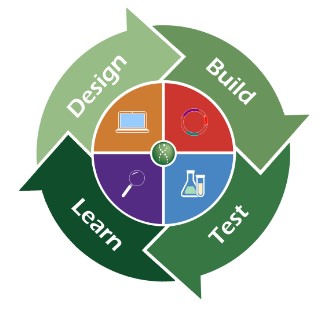
At Synbio Technologies, we are passionate about advancing scientific discoveries through the cutting-edge tools and services we offer in synthetic biology. Our proprietary platform, consisting of bio-design, biosynthesis, and bio-learning, enables us to provide a comprehensive range of Design-Build-Test-Learn (DBTL) steps throughout the pipeline, from DNA reading to genome editing and everything in between.
Synthetic biology is an interdisciplinary field that combines biology, engineering, and computer science to create new biological entities and modify existing ones. The goal of synthetic biology is to provide sustainable solutions to problems and to create new products for industries, agriculture, and medicine.
Our team of Ph.D.-level scientists specializes in various areas of synthetic biology, including DNA reading, vector design, DNA synthesis, strain construction, directed evolution, and genome editing. We are available to offer consultation, evaluation, and execution of your interests in all DBTL service areas, ensuring that your research is conducted with the utmost efficiency and accuracy.
At Synbio Technologies, we understand that each research project is unique, and we offer a range of services to cater to your specific needs. Our services include pathway design, DNA synthesis, strain construction, strain optimization, metabolite analysis, and bioprocess development to name a few. Our mission is to provide you with a complete solution that takes your research from conception to execution and ultimately to success.
We pride ourselves on our niche platforms, including our Syno 2.0 platform, which can synthesize any simple or complex gene sequence, and our Syno 3.0 high-throughput synthesis platform, designed to handle large-scale gene fragment synthesis, such as pathway synthesis and small genome synthesis. Our professional team is extensively experienced in the synthetic biology field and is committed to supporting your research every step of the way, providing you with trusted technical support that you can rely on.
If you’re looking for a trustworthy partner to advance your research in synthetic biology, look no further than Synbio Technologies.
Applications
Synthetic biology has many exciting applications across a wide range of industries, from medicine and biotechnology to food and agriculture. Here are just a few examples of synthetic biology applications that are currently being developed and tested:
1. Biomedical applications – Synthetic biology offers exciting potential for creating new therapies for a wide range of diseases and medical conditions. Scientists are exploring the use of engineered cell-based therapies to treat cancer, neurodegenerative disorders, and autoimmune diseases. Additionally, synthetic biology is being used to develop diagnostic tools that can detect diseases earlier and more accurately than current methods.
2. Bioremediation – Synthetic biology has the potential to revolutionize the way we clean up environmental pollution. Scientists are designing synthetic microorganisms that can break down toxic substances and remove them from soil and water. These microorganisms could be used to clean up oil spills, industrial waste, and other environmental hazards.
3. Agriculture – Synthetic biology is being used to develop new crop varieties that are resistant to pests, more nutritious, and more sustainable. Scientists are using synthetic biology tools to enhance plant growth and increase crop yields. Additionally, synthetic biology is being used to develop new animal feeds that are more efficient and sustainable.
4. Energy – Synthetic biology has the potential to transform the way we produce and use energy. Scientists are using synthetic biology tools to create new biofuels that are more efficient and environmentally friendly than traditional fuels. Additionally, synthetic biology is being used to develop new methods for storing and transporting energy.
5. Industrial applications – Synthetic biology is being used to develop new products and materials that are more sustainable and environmentally friendly than traditional ones. Scientists are using synthetic biology tools to create new bioplastics, biofuels, and other biomaterials. Additionally, synthetic biology is being used to develop new methods for manufacturing pharmaceuticals, chemicals, and other industrial products.

